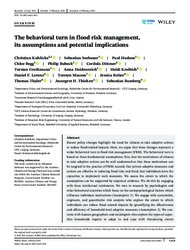The behavioral turn in flood risk management, its assumptions and potential implications
DOI: https://doi.org/10.1002/wat2.1418
Persistent URL: http://resolver.sub.uni-goettingen.de/purl?gldocs-11858/8512
Persistent URL: http://resolver.sub.uni-goettingen.de/purl?gldocs-11858/8512
Kuhlicke, Christian; Seebauer, Sebastian; Hudson, Paul; Begg, Chloe; Bubeck, Philip; Dittmer, Cordula; Grothmann, Torsten; Heidenreich, Anna; Kreibich, Heidi; Lorenz, Daniel F.; Masson, Torsten; Reiter, Jessica; Thaler, Thomas; Thieken, Annegret H.; Bamberg, Sebastian, 2020: The behavioral turn in flood risk management, its assumptions and potential implications. In: Wiley Interdisciplinary Reviews: Water, Band 7, 3, DOI: 10.1002/wat2.1418.
 |
Dokument öffnen: |
Recent policy changes highlight the need for citizens to take adaptive actions to reduce flood‐related impacts. Here, we argue that these changes represent a wider behavioral turn in flood risk management (FRM). The behavioral turn is based on three fundamental assumptions: first, that the motivations of citizens to take adaptive actions can be well understood so that these motivations can be targeted in the practice of FRM; second, that private adaptive measures and actions are effective in reducing flood risk; and third, that individuals have the capacities to implement such measures. We assess the extent to which the assumptions can be supported by empirical evidence. We do this by engaging with three intellectual catchments. We turn to research by psychologists and other behavioral scientists which focus on the sociopsychological factors which influence individual motivations (Assumption 1). We engage with economists, engineers, and quantitative risk analysts who explore the extent to which individuals can reduce flood related impacts by quantifying the effectiveness and efficiency of household‐level adaptive measures (Assumption 2). We converse with human geographers and sociologists who explore the types of capacities households require to adapt to and cope with threatening events (Assumption 3). We believe that an investigation of the behavioral turn is important because if the outlined assumptions do not hold, there is a risk of creating and strengthening inequalities in FRM. Therefore, we outline the current intellectual and empirical knowledge as well as future research needs. Generally, we argue that more collaboration across intellectual catchments is needed, that future research should be more theoretically grounded and become methodologically more rigorous and at the same time focus more explicitly on the normative underpinnings of the behavioral turn.
This article is categorized under:
Engineering Water > Planning Water
Human Water > Water Governance
Science of Water > Water Extremes
Statistik:
ZugriffsstatistikSammlung:
- Geographie, Hydrologie [454]
This is an open access article under the terms of the Creative Commons Attribution License, which permits use, distribution and reproduction in any medium, provided the original work is properly cited.

